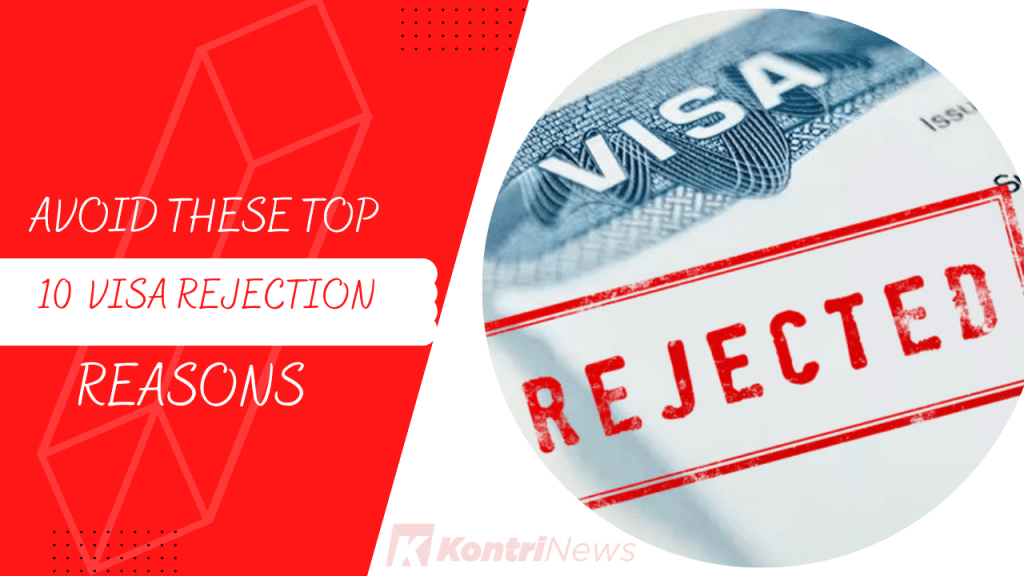Avoid These Top 10 visa Rejection Reasons

If you’re like most people who dream of traveling the world, then you’ve probably had to deal with the hassle of getting a visa. And if you’re like most people, you’ve also been denied a visa at least once. But don’t worry there are plenty of ways to overcome a visa rejection. In this article, we’ll outline the reasons why visas are often rejected, and we’ll give you some tips on how to avoid these common pitfalls. So read on and start planning your next adventure!
There are many reasons why a visa application may be rejected. Some of the most common reasons include:
- False Reasons For Traveling
- Failure To Provide Adequate Proof Of Eligibility
- Poor National Ties With The Current Country Of Residence
- Return intention Not Clear
- Invalid or Incomplete Documents
- Negative Visa History
- Infectious Diseases.
- No itinerary
- Visa Type Not Specified Properly
- Invalid letter of Reference
1. False Reasons For Traveling
People travel for various reasons. However, when applying for a visa, it is important to have genuine reasons for traveling to avoid denial. Some common reasons for travel include business, pleasure, education, and family.
Business travel is often necessary for work-related purposes, such as attending conferences or meetings. Pleasure travel can include things like vacationing or going on a cruise. A student visa is required for students who are studying abroad. Family reasons for traveling include visiting relatives or going on a family reunion.
It is important to remember that the reasons given for travel must be genuine to avoid visa rejection. Some people may try to give false reasons to obtain a visa, but this is not advisable. when the embassy or consulate suspects that the reasons for travel are not genuine, the visa will be denied.
When applying for a visa, have genuine reasons for traveling. Providing false information on a visa application can result in denial.
2. Failure To Provide Adequate Proof Of Eligibility
There are many visa rejection reasons. One of the most common reasons is failure to provide adequate proof of eligibility. To obtain a visa you must show that you meet all requirements for travel. such as a valid passport, sufficient financial resources, and a bona fide reason for traveling. must also show that you are not inadmissible. Failure to provide adequate proof of eligibility can result in a visa rejection.
3. No National Ties With The Current Country Of Residence
Not having significant national ties with the current country of residence is one major visa rejection reason.
this applies to non-immigrant visa applications.
It means you do not have strong enough ties to your home country to warrant a return trip. There are several ways to show national ties, this includes showing evidence of:
- Owning property in the home country
- Having family in the home country
- A job in your home country
- Significant financial ties to the home country
4. Return intention Not Clear
The consular officer of the country you intend to travel to will do their best to make sure you return to your country of residence. won’t want travelers to go constitute a nuisance in their country.
It’s important to make sure that you have the proper documentation in order. This includes a detailed explanation of how you intend to stay and state why you must return on the said date.
One way is showing proof of ties to your home country, this means demonstrating you have reasons to return to your home country after your trip.
5. Invalid or Incomplete Documents
As you know, one of the requirements for getting a visa is having valid and complete documentation. If you don’t have these things, likely, your visa application won’t be granted.
If you’re unsure what documents you need or have any questions about the documentation requirements, you should contact the embassy or consulate where you’re applying for your visa or consult a travel expert
6. Negative Visa History
If you have a bad visa history, your visa application will likely be denied.
Additionally, if you have been issued a visa and then had it revoked, this will also negatively impact your chances of being granted a visa in the future.
This is because you may be seen as a high-risk applicant, and the consulate may think that you are more likely to overstay your visa or commit other immigration violations.
7. Infectious Diseases
It’s no secret that having an infectious disease can make it difficult to travel. In fact, in some cases, it can even lead to visa rejection.
There are some reasons why this might happen. For one, countries want to protect their citizens from diseases that travelers could potentially bring in. And for another, some countries simply don’t have the infrastructure to deal with sick travelers.
Of course, not all infectious diseases are created equal. Some, like Ebola and Covid, are much more serious than others. And as a result, they tend to be treated much differently by immigration authorities.
Generally speaking, if you have a communicable disease that is considered to be a public health risk, you will likely be denied a visa.
8. No Clear itinerary
Another reason why having no itinerary can cause visa denial is because it makes it appear as though you are not serious about your travel plans. Consulate officers want to see that you have made a concrete plan and are committed to following through with it. If you cannot show them a detailed itinerary, they may think that you are not sure about your travel plans and could be more likely to overstay your visa or engage in other activities that are not allowed.
So, if you are planning to apply for a visa, make sure that you have a clear and complete itinerary. This will increase your chances of getting your visa approved and help you avoid any problems during your travels.
9. Visa Type Not Specified Properly
If you don’t specify the type of visa you’re applying for, it may result in delays in processing your application or denial. Make sure to include the specific type of visa you’re applying for on your application form.
If you are unsure of which visa type to apply for, there are many resources available to help you determine the best visa for your travel plans, the visa application website has a wealth of information on visas and the application process. You can also consult with a travel consultant to get specific advice tailored to your travel plans.
10. Not Having a letter of Reference
If you are applying for a visa to travel to another country, one of the requirements may be a letter of reference from your current employer. This letter can vouch for your character and attest to the fact that you are employed in good standing. Without this letter, your visa application may be denied.
There are a few ways that you can obtain a letter of reference from your employer. The easiest way is to request one from your human resources department. Many employers keep template letters on hand that can be easily customized for each employee.
If you are self-employed, you can ask a client or customer to write a letter of reference for you. Be sure to provide them with information about your work history and accomplishments.
A letter of reference can be a valuable asset when applying for a visa. If you do not have one, be sure to take the time to request one from your employer or another trusted source. Without it, your visa application may be at risk of denial.
Conclusion
Although there are many reasons why your visa application may be rejected, following the advice in this post will help you avoid the most common ones.
Make sure to provide adequate proof of your eligibility and have a clear return intention, ensure all of your documents are complete and accurate and be mindful of the tone of your letter of reference.
If you take these precautions, you’re much more likely to receive your visa without any issues.
Have you ever had a visa application denied? Let us know why in the comments below.
Read more of our interesting Articles: 7 Tips To Get Sales For Your Business








